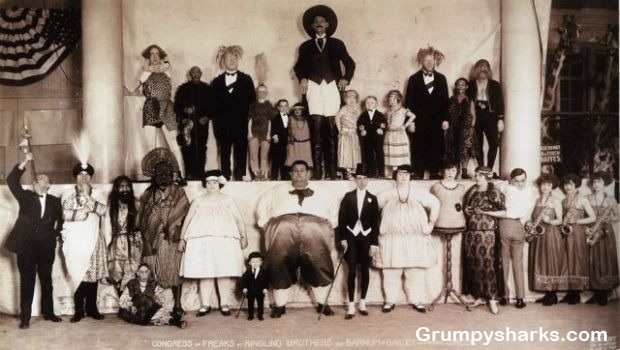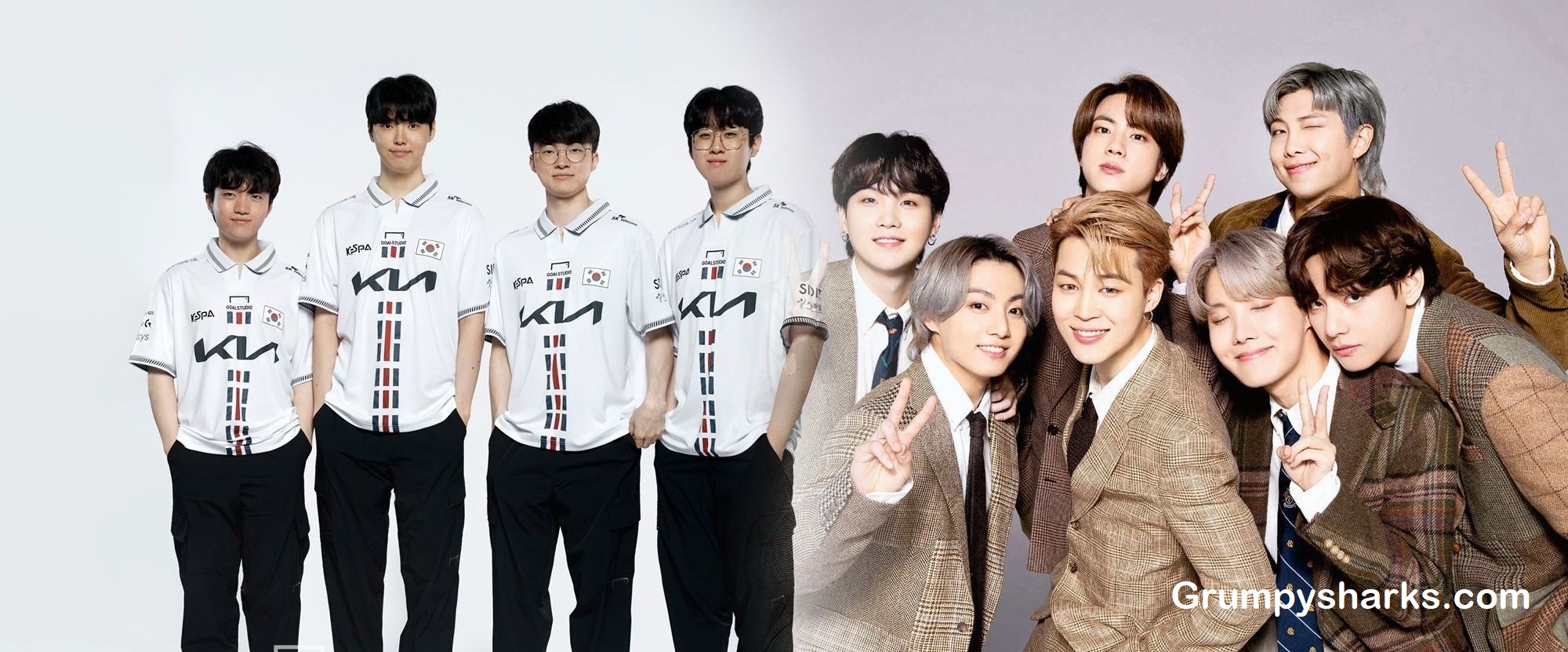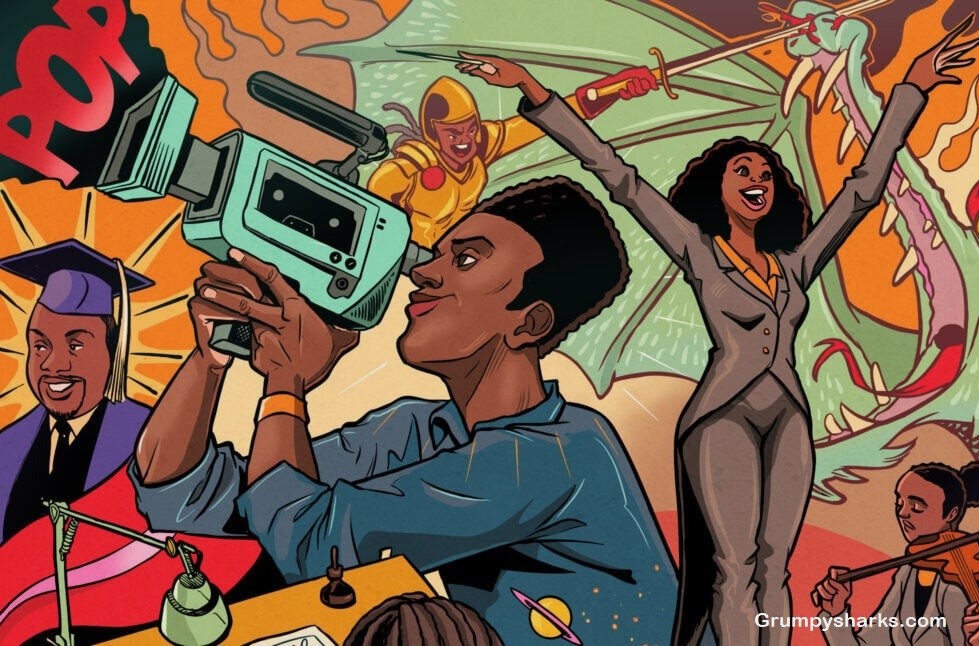The Global Reach of Geek Culture: Why It’s Not Just a Western Thing
Geek culture has long been associated with the Western world, driven by comic books, superhero movies, and the rise of video games in the U.S. and Europe. For many years, it was a niche interest largely enjoyed by Western audiences, with major conventions like Comic-Con and dedicated fandoms for Marvel, Star Wars, and Dungeons & Dragons leading the charge.
But at Grumpy Sharks, we’ve witnessed a transformation. Geek culture has evolved far beyond its Western beginnings. Today, it’s a global phenomenon. Whether it’s anime fans in Japan, gaming communities in South Korea, or cosplay cultures in Brazil, geek culture has crossed borders and is embraced by people from all corners of the world.
This article draws from the Grumpy Sharks team’s experience and deep passion for geek culture. We’ll explore how it grew from a Western-centric interest into a worldwide movement. We’ll also examine how it’s shaped by different cultures and why it remains one of the most influential forces in today’s entertainment and creative industries.
#1 What Are the Origins of Geek Culture in the West?
Over the years, the word geek has taken on a life of its own. It began as a label for carnival oddities who might bite off the head of a live chicken for applause . In early nineteenth-century Scotland, the term geck, meaning fool, mutated into geek and was thus linked with these performers .
By the mid-twentieth century, especially in America, the word started to shift again. Geek began describing people who cared deeply about narrow topics such as sci-fi, tech, and comics. Thriving fandoms, comic cons, and the first waves of hobbyist programming all fed the scene we now call geek culture.
The 1960s and 70s brought a true turning point. Star Trek sparked fervid followings, spawning conventions and fan fiction overnight. At the same time, early personal computers and arcade games pulled in fresh devotees, stretching geek culture in exciting new directions.
By the 1980s and 1990s, home computers spread through living rooms, the internet slowly unfurled itself, and blockbuster sci-fi and fantasy hits packed theaters, so geek culture finally crept into the mainstream. A pastime once brushed aside as odd had suddenly morphed into a noticeable slice of popular pop culture.
#2 How Has Geek Culture Gone Global?
The answer is simple: it’s everywhere now. What began as a small, local niche is now a worldwide movement, connecting fans from every corner of the globe. With the rise of the internet and global media, what once felt exclusive has opened up to anyone with a screen and an internet connection
1. The Internet and Media Globalization
Because the internet never sleeps, what began as a local nerd hobby has turned into a worldwide phenomenon. Social networks, live streams, and open forums on Reddit, Twitch, or YouTube let fans from every timezone meet, joke, remix, and build together. Geek culture no longer revolves only around Hollywood headlines or Silicon Valley launches-its rhythm now comes from Brazil, Japan, South Korea, Germany, and countless other places, each crowd shaping the next big trend.
Platforms like Netflix, Crunchyroll, and dozens of others pump anime, indie series, or subtitled films straight into living rooms, inviting viewers to wander through entirely new narratives. Thanks to this pipeline, once-tiny communities have spilled into the mainstream, and geographic borders now feel more like screen sizes than real limits.
2. Across Borders, Fans Come Together
Its honestly wild how fast geek squads have popped up outside the West. Sure, U.S. shows like Comic-Con steal headlines, but events such as Germanys Gamescom, Tokyos Comiket, and Brazils CCXP now throw enormous love-fests for every corner of fandom. What once felt niche now fills mainstream talk, and fans everywhere are sketching tomorrows pop culture.
Because fandoms cross borders, todays geek scene feels like a single shared party. Whether folks host meet-ups in sleepy towns or stream worldwide panels born during lockdown, the spirit travels far beyond one passport. Communities now blend styles, humor, and rituals from everywhere, remixing the old into fresh, global vernacular.
3.The Role of Global Conventions Like Comic-Con, Gamescom, and More
Fan conventions have always been the beating heart of geek culture, and now that culture spills across national borders, so do the shows themselves. Events such as Comic-Con in San Diego or Gamescom in Cologne pull in crowds far beyond local ticket holders, as die-hard fans fly, drive, or even train halfway around the world to share a weekend with people who speak the same shorthand. Because of this mix, a single exhibition hall can feel like a mini United Nations of comic books, video games, and cosplay, and officials often joke that the event translators could run a booth of their own.
Yet the real magic happens outside the panel rooms and sales aisles, in the casual meet-ups and late-night conversations that sprout wherever two badges collide. Here, fans trade theories about storylines, debate which superhero deserves top billing, and swap tips on everything from crafting an Iron Man suit to beating that last pesky level in a beloved RPG. The moment a gamer from Japan fist-bumps an artist from Brazil and both shout, Lets level up!, the crowd knows borders no longer matter; they are part of a shared adventure that reaches far past the convention center walls, and that feeling keeps them returning year after year.
#3 How Do Regional Expressions of Geek Culture Differ?
1. Japan: Anime and Manga as a way of life with mania for technology
In Japan, the geek culture is embedded in all layers of life, literally. The concepts of anime and manga are more than say hobbies, they are a part of cultural structures. People of every age are adopting aspects of these mediums into their everyday lives, from how people dress, to how they speak. Events such as Comic Market—the world’s largest comic book convention where hundreds of thousands attend—have had an incredible impact on geek culture as a whole. Then there is the culture of gadgetry, and the entire global trend of tech inspired gaiety is indebted to Japanese influence as well. With its mish-mash of creativity, tech, and fandom, Japan’s geek culture continues to provide a bunch of global geek trends and ideas.
2. K-Pop Fandoms and eSports: South Korea
In South Korea, geek culture appears in unique forms. K-Pop fandoms have tremendous strength, and they bring fans from around the globe together to support these idols. The energized, loyal fandom creates large, interactive communities. eSports, on the other hand, is a cultural phenomenon in South Korea. Professional gaming has turned into a national pastime, with huge tournaments, and they are not just streamed online, they are broadcast on television. South Korea’s mix of entertainment, gaming, and fandom participation illustrates variations of geek culture across the globe.
3. Latin America: Comic Book Resurgence and a Culture of Cosplay
Comic books and the culture surrounding cosplay are on the rise in Latin America. Comic book shops and conventions are expanding, especially in countries like Brazil and Mexico, where Comic-Con has become an annual event. CCXP in Brazil is, in fact, one of the largest comic cons in the entire world. Cosplay culture in Latin America is thriving, with fans dressing up not only as superheroes but also anime and video game characters, among others. Latin American cosplayers exhibit some of the most creative and talented work in the world that contribute to the on-going expansion and excitement of geek culture in the region.
4. Europe: Sci-Fi Literature, Tabletop Games, & Local Conventions
Europe has always established itself as a center of sci-fi literature with writers like Issac Asimov and Arthur C. Clarke influencing generations of geeks. The love of sci-fi is still there but it’s expanded to include board gaming and local conventions. Countries like the UK, Germany, and France have vibrant communities around board games, tabletop games and roleplay games like tabletop Warhammer, and Dungeons & Dragons which is seeing a resurgence. Europe has a breadth of geek scene with local conventions and general geekery celebrating everything from literature to video games, and this breadth of geek culture is very exciting.
#4 Why Is Localization Important in Cultural Exchange
Localization and cultural exchange are crucial to the transnational circulation of geek culture. It is important to note that localization, cultural exchanges, fan practices, and the types of platforms that have evolved over time all allow for geek culture to reach new audiences in a way that feels inclusive and accessible. In light of this, let’s consider three important ways in which localization and cultural exchange matter to fandom on a global scale:
1. How Franchise Adapt to Local Perspectives (Marvel in India, Star Wars in China)
Franchises such as Marvel and Star Wars recognize that they must adapt to local cultures to sustain their transnational audiences. For instance, Marvel introduced characters with Indian heritage that relate more closely to Indian audiences (heromachine.com). Star Wars tailored the locations and marketing focus by exploring different aspects of the story in order to remain sensitive to the cultural landscape in China (Asian Americans in the Media, 2020).
2. Global Fan Art, Fan Fiction, and Remixes
Have you ever wanted to be creative by sharing fan art, fan fiction, or creative remixes? A worldwide exchange of fan art, fan fiction, and creative remixes has become a fantastic way for fans from all different backgrounds to demonstrate their passion for geek culture. Via platforms like Instagram, Tumblr, and Reddit, fans from around the world upload and share their aesthetic interpretations of beloved characters or written stories, while often including elements from their own cultures and traditions. The global exchange of fan interpretations has resulted in wonderfully diverse and creative content being shared across countries and cultures, whether it is Star Wars fan fiction in Brazil, Marvel-inspired manga in Japan, etc. This global exchange has created a collaboration that is erasing boundaries and connecting fans through collective passion.
3. Streaming Services as Global Content Bridges
Streaming services, like Netflix, Disney+, and Amazon Prime, have changed how content is presented and consumed across the globe. The addition of subtitles, dubbing, and regional content libraries creates cultural flexibility to take down language and cultural barriers for global consumers. As a result, Korean dramas, Japanese anime, and American series are being enjoyed by larger audiences in countries that were previously considered niche. Streaming services are more than a mode of entertainment, they are cultural connectors that allow access to geek content by improving accessibility on a global scale.
#5 Breaking the Western-Centric Myth
1. The Misconception of Geek Culture being “American”
The stereotype is that geek culture was, first and foremost, an American thing. Movies driven by Hollywood, comic book companies based in U.S. cities, and technology being developed daily in Silicon Valley all seem to suggest that geek culture largely had a home, it had its place and that home was in the West. Such a view places a limit on how we think of the present landscape of geek culture and on its global impact today. There is a unique home to geek culture in many different forms depending on which part of the world you are in. We see this with Japanese anime, Brazilian cosplay, and Indian film, to name only a few. Geek culture has blossomed into an international phenomenon that frequently collaborates and creates differences in region, membership, and style.
2. The Contributions by Non-Western Creators & Fan Communities
Currently, non-Western creators and fan communities essentially not only define what geek culture is, but also encompass what it can become. In other words, if there were no creators of Japanese anime and manga in the entertainment supply chain, you could write off the European and American comic book industry as a dying industry. The rise of Korean webcomics (manhwa) and Chinese wuxia novels, have gained their respective international followings as well. In specific nation states, namely; South Korea, India, and Mexico, we can see active participation of fans in producing geek culture as well, which has been the biggest differentiator and new norm in defining a now decentralized, non-Western genre of geek culture. The new foreign voices and experiences are changing the future of geekdom, by eliminating the exclusivity of geek culture being solely a Western interest but creating a new communal global movement towards ease of access and adaptation of geekdom.
3. Global Co-Productions Examples and Fandom Crossovers
Geek culture is flourishing today and crosses borders through creative collaboration and partnerships happening in the entertainment industry. If we take the Netflix series The Witcher as an example, it represents the intersection of Polish literature, American television production and global representation of fandom—and it works, with fandom spread across the world. This is not limited to The Witcher and fandom for comics. Marvel Comics, for example, made its way into anime series in Japan and Star Wars has inspired fandom from countries all around the world. These partnerships are not simply a mixture of cultures, rather shared ownership of the stories which are evidence of the fact that geek culture is not exclusive to one region but rather a thriving global fandom that is connected in ways that contribute equally.
# 6 Conclusion
The boundaries of geek culture have become virtually non-existent. What began as small communities by many fans in different parts of the West, has taken shape and grown into a global community of fans, reaching completely across continents and cultures. These fans all share interconnected themes of passion, creativity, and inclusivity, and today geek culture is proven all over the world, like anime in Japan, Brasilian cosplay, and more, it is not strictly American.
When thinking of the future of geek trends globally, there is a bright path ahead. The continuing emergence of fandoms around the world and the continued bridge building between media from around the world, we only anticipate geek culture to engage new participants and reveal a multitude of beautiful expressions of what is geek culture. At Grumpy Sharks we want to encourage all forms of geek expressions, everywhere, and appreciate all contributions from various places on earth!
Paito HK
Paito HK
Paito HK
Paito HK
Paito HK
Paito HK
slot dana
terminal4d
slot dana
terminal4d
terminal4d
terminal4d
terminal4d
https://terminal4d.co/
terminal4d
sudirman168
terminal4d
terminal4d
terminal4d
terminal4d
toto slot
toto slot
toto togel
toto slot
terminal4d
toto slot
slot togel
Paito HK
Paito HK
Paito HK
Paito HK
Paito HK
slot ngacir
Paito HK
Paito HK
slot online
terminal4d
toto slot
Paito HK
Paito HK
Paito HK
Paito HK
Paito HK
Paito HK
Paito HK
Paito HK
Paito HK
Paito HK
Paito HK
Paito HK
Paito HK
Paito HK
Paito HK
Paito HK
Paito HK
Paito HK
Paito HK
Paito HK
Paito HK
Paito HK
Paito HK
Paito HK
Paito HK
Paito HK
Paito HK
Paito HK
Paito HK
Paito HK
Paito HK
Paito HK
Paito HK
Paito HK
Paito HK
Paito HK
Paito HK
Paito HK
Paito HK
Paito HK
Paito HK
Paito HK
Paito HK
Paito HK
Paito HK
Paito HK
Paito HK
Paito HK
Paito HK
Paito HK
Paito HK
Paito HK
Paito HK
Paito HK
Paito HK
Paito HK
Paito HK
Paito HK
Paito HK
Paito HK
Paito HK
Paito HK
Paito HK
Paito HK
Paito HK
Paito HK
Paito HK
Slot88
Paito HK
Paito HK
Paito HK
Paito HK
Toto4d
Toto4d
Paito Hk
Toto Slot Gacor
Akun Toto
Akun Toto
Akun Toto
Akun Toto
Situs Toto
Akun Toto
Akun Toto
slot gacor
slot gacor
slot gacor
terminal4d
toto slot
toto slot
toto slot
toto slot
toto 4d
Toto SLot
Toto SLot
Toto SLot
Togel Slot
Togel Slot
Toto Slot
Toto Slot
Toto Slot
Toto Slot
Toto Slot
Toto Slot











